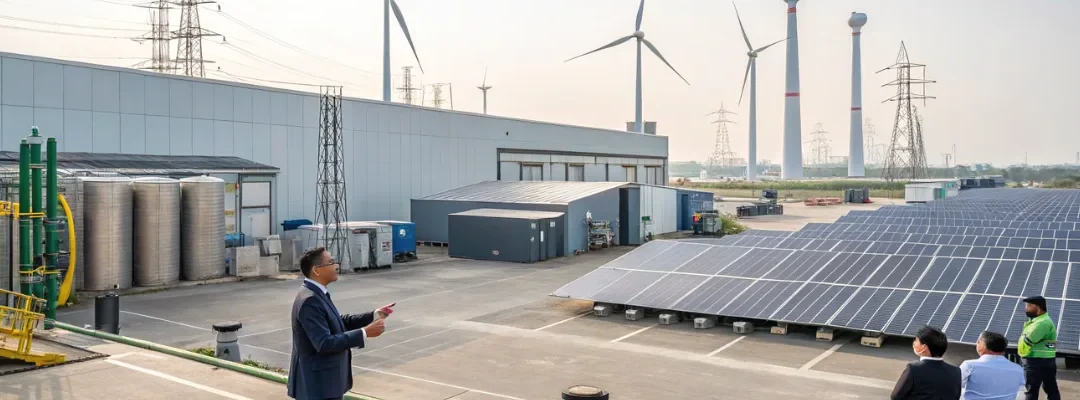Introduction
As electricity prices rise and ESG compliance tightens, Indian businesses are under pressure to cut costs while going green. From industrial giants to fast-growing tech parks, many are turning to a powerful solution:
Power Purchase Agreements (PPAs) — long-term renewable energy contracts that offer lower tariffs, price stability, and sustainability without upfront capital investment.
Let’s explore why PPAs are becoming a go-to strategy for corporate energy procurement in India.
What Exactly is a Power Purchase Agreement (PPA)?
A Power Purchase Agreement (PPA) is a legally binding contract between a business (the energy buyer) and a renewable energy developer (the supplier).
Here’s how it works:
- The developer builds and operates a renewable energy plant (solar, wind, or hybrid).
- The business buys power at a fixed tariff, often 20–40% cheaper than the grid.
- Typical contract length: 10 to 25 years.
- No ownership or capital cost for the business.
In essence: Your company locks in cheaper, clean electricity — while someone else handles the system.
Why Businesses Are Rapidly Adopting PPAs
1. Major Cost Reductions
- PPA tariffs: ₹4.5–5/unit
- Grid tariffs: ₹7–10/unit
- Savings: ₹2–4 per unit
- Annual impact: ₹10–₹50+ crore, depending on scale
Example:
A 25 MW manufacturing facility could save ₹18–25 crore annually under a well-structured PPA.
2. No Upfront Investment
- The developer finances the entire project.
- You only pay for the electricity you consume.
- Avoids heavy capital lock-in — perfect for CFO-led decision making.
3. Locked-In Energy Prices
- Hedge against volatile grid prices and fossil fuel price shocks.
- Predictable OPEX for the long term.
- Ideal for industries with slim margins or global pricing pressure.
4. Meet ESG & Net-Zero Goals
- PPAs enable 100% RE procurement (RE100 commitments).
- Companies can claim Scope 2 emission reductions.
- Enhances sustainability rankings and vendor eligibility.
5. Zero Maintenance Burden
- Developer handles operations, cleaning, system performance.
- You focus on production, logistics, or IT — not kilowatt-hours.
6. ESG Funding and Global Market Advantage
- Renewable procurement attracts ESG-aligned investors.
- Buyers in global supply chains increasingly require clean energy compliance.
- Renewable PPAs signal leadership and responsibility to partners and consumers alike.
Case Studies: PPAs in Action
Textile Manufacturer – Tamil Nadu
- 30 MW off-site PPA
- PPA Tariff: ₹4.7/unit vs Grid: ₹7.8/unit
- Annual Savings: ₹18 crore
- Carbon Emissions Cut: 25,000 tons/year
- Outcome: Boosted margins and ESG credentials
Bengaluru IT Park
- 20-year PPA with 30 MW solar plant
- Reduced electricity bills by 40%
- Achieved higher GRESB sustainability score
- Attracted new international tenants
What Type of PPA is Right for Your Business?
| Model | Description | Best For |
|---|---|---|
| On-Site PPA | Solar installed on your rooftop or premises | Factories, warehouses, offices |
| Open Access PPA | Power wheeled through grid from remote solar parks | Large-scale users in RE-friendly states |
| Group Captive PPA | Multiple companies co-own and use power from a shared renewable plant | Industrial clusters or associations |
Flexibility makes PPAs ideal for all sectors — from textiles to tech, pharma to logistics.
The Future of Energy Procurement in India
India is witnessing a paradigm shift:
- Open Access reforms are making inter-state PPAs easier
- DISCOM surcharges are being streamlined
- Mandatory RE disclosures are on the rise
- Global buyers are demanding carbon transparency from suppliers
By 2030, PPAs could power up to 50% of commercial and industrial consumption — driven by cost savings and compliance.

